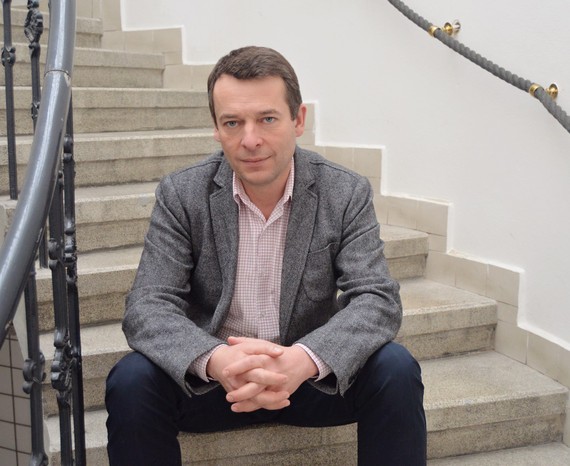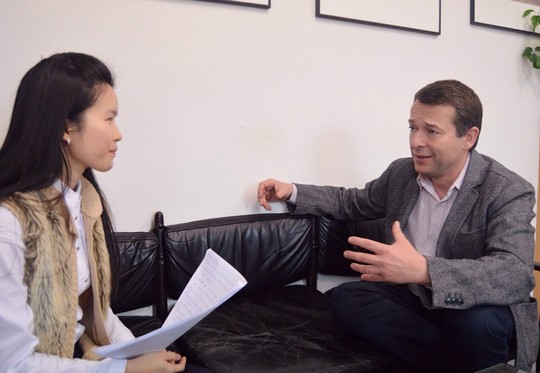Simon Panek is the cofounder and director of the People In Need humanitarian organization, the largest nongovernmental organization in Central Europe.
After cofounding People In Need in 1992, Panek has worked worldwide to ease the suffering of people in times of crisis, be it war, famine, or flood, and has become highly respected in both the Czech Republic and abroad. People In Need is also the organizer of the One World International Human Rights Documentary Film Festival, currently the world's largest documentary film festival focusing on human rights. By extension, the One World in Schools programme, which uses films and interactive lessons to discuss complicated topics with children and that has recently expanded its educational aid offerings, is currently used by thousands of teachers in nearly 2,000 schools. Panek has also received many prestigious awards, including the Czech State Medal of Merit and European of the Year Award.
Lan Anh Vu sat down with Panek to hear more about his journey, the challenges that he has faced along the way, and his advice for young people across the world.
As told to Lan Anh Vu
Why I Pursued a Career in Non-profit Management
Basically, I was brought up in the tradition of the scouts, part of which is to help others. Serving others in society is the principle part of the scouting movement. Some people have strong feelings about society, while others don't. I've always had quite strong feelings about society, even during the communism of the 1980s, when I was part of the pro-environment movement in the Czechoslovakia.
In 1988, a strong earthquake hit Armenia, which was part of the Soviet Union at the time, and my friends and I spontaneously organized informal and unofficial humanitarian assistance. We collected various warm articles of clothing, sleeping bags, and other things to help people affected by the earthquake. We felt that, if we could, then we should help others in crisis.
Based on that experience, I learned that things should be right and good and that, if you can, then you should contribute to making things that way. Part of setting things right is helping people who are in need. So, in 1992, my friends and I cofounded a humanitarian organization to mitigate the suffering of people during times of crisis.
Challenges
In 2001-2002, just after the fall of the Taliban in Afghanistan, in the northern part of the country, there were around 500,000 people in IDPs camps. They were there partially because of insecurity and the difficult socioeconomic situation, partly due to severe ongoing droughts.
It was very challenging. There were only a few organizations to assist the half-million people in the camps. Plus, we were newcomers. I spent hours and hours sitting with elders in the tribes and families in the IDPs camps discussing how we could help them. In the beginning, they just repeated that they needed more fuel to heat and to cook and more tents. But I realized that those things weren't really what they needed, so I asked them how I could truly help them, what they truly needed. One of the elders answered that they needed to go back to their villages: to their homeland. And that was the answer.
We were newcomers and came to the NGO coordination meeting with the proposal to return the IDP refugees to their homes. We were challenged, because everyone was preoccupied with the number of nutrients people were getting and the metrics of rice land and other things. But then the UN supported us. With its support, we piloted the first return: a convoy of 50 trucks with families and everything that went back to the mountains on a two-day trip. First, it was 1,000 people, but within six months, tens of thousands of people had returned home. Once we changed our thinking about how we could help, all that remained were technical and financial issues about doing it.
Lessons Learned
I've learned as a leader that it is difficult to have a hand in everything. So I've learned to delegate things to my team members. I always try to inspire and encourage people to work independently and to judge how much they are willing to do on their own. Top-down leaders are not always the best. I appreciate proactivity and reward people who step up and take ownership.
I am fortunate to work with strong, dedicated, and driven people on my team, all of whom share the same vision as I do. As you grow from three to 1,500 people, you cannot orchestrate growth. You need to make sure that you work with people who value what you value, are better than you at what they do, and try to achieve the same goal.
Global Humanitarian Situation
From a humanitarian point of view, the current global humanitarian situation is bad. Just take a look at the number of people on the move--the refugees. It's the highest number since World War II. The Middle East is in a very bad shape, and climate change is visibly affecting huge areas in Africa and more places in Asia as well. Plus, this year, El Niño is coming again, which will hit Africa. From a humanitarian point of view, the situation is more difficult than it was 20 years ago.
Advice for Young People
It is more important to live than to have. A meaningful life connects people to a larger sense of purpose and value, by making positive contributions, not only to their personal and spiritual growth, but also to society and human civilization as a whole. So, it is important to live a meaningful life, to do interesting things, and to be surrounded by people who live for something, not just wages. Do something that really gives you strong, positive feedback that makes you feel that you are useful, that you are not just a number in the system that can be replaced by another number. I think that is a very important thing. Life should be full of purpose.
This interview has been condensed and edited for clarity.
This post is part of "How I Got There" series, which features people around the world speaking about their journeys. What is the path to success? What challenges did people face and how did they overcome them? Lan Anh and her guests answer all these questions and much more. To view the entire series, visit here.


